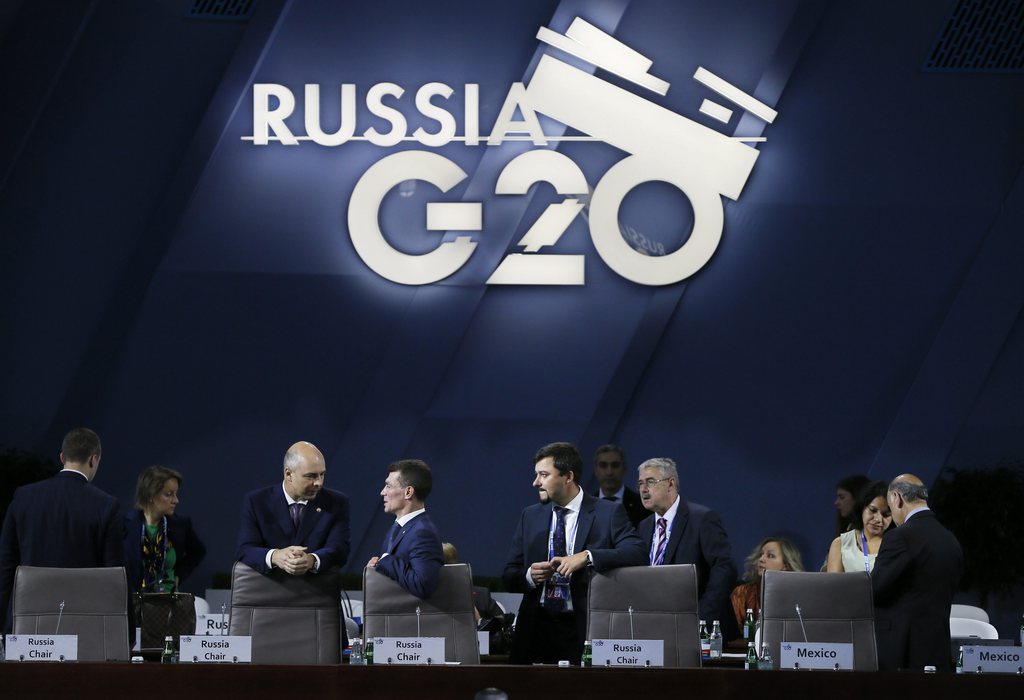Global corporate tax plan wins Swiss approval

Switzerland, home to numerous multinational corporate headquarters, has given its backing to a global overhaul of company taxation rules that aims to stop profits being unfairly sucked into low tax jurisdictions.
Swiss cantons have dismissed the idea that the proposed regulations could make them less attractive venues for foreign firms. But some observers feel the proposals do not go far enough to make a real difference or that they will be too difficult to implement.
The corporate tax crackdown was drawn up by the Organisation for Economic Co-operation and Development (OECD) and adopted by a G20 meeting of finance ministers in Moscow on Friday. Switzerland was represented for the first time at such a meeting by Finance Minister Eveline Widmer-Schlumpf and Swiss National Bank head Thomas Jordan.
Following the conclusion of the G20 finance ministers’ meeting, Widmer-Schlumpf told the media she was happy with what had been decided and said Switzerland “hadn’t done too badly” at making the most of its seat at the table. However, she admitted that the legal reforms for plugging corporate tax loopholes “could take longer to implement” and would require more work to bring into practice.
The OECD initiative was drawn up in response to public outrage at current rules that allow multinational firms to legally divert profits to countries with lower tax rates. Corporate giants such as Starbucks and Amazon have faced fierce criticism for conducting such practices, as have the countries that allow this to happen.
The new 15-point plan includes ways to close loopholes and allow countries to tax profits held in offshore subsidiaries. If it is adopted, the measures would be implemented over the next two years and target such practices as deducting the same expense more than once, in more than one country.
The plan also has a special focus on the digital economy, where commerce flows across borders constantly and it’s harder to tie revenue and profit to a single country.
G20 finance officials are also looking at giving countries a score of one to four depending on how cooperative they are with other governments on tax evasion, tax fraud and money laundering.
The Group of Twenty (G20) is the premier forum for international cooperation on the most important issues of the global economic and financial agenda.
The objectives of the G20 refer to: policy coordination between its members in order to achieve global economic stability and sustainable growth; promoting financial regulations that reduce risks and prevent future financial crises; and modernising international financial architecture.
The G20 brings together finance ministers and central bank governors from 19 countries: Argentina, Australia, Brazil, Canada, China, France, Germany, India, Indonesia, Italy, Japan, the Republic of Korea, Mexico, Russia, Saudi Arabia, South Africa, Turkey, Britain, the United States plus the European Union, which is represented by the president of the European Council and by the head of the European Central Bank.
The G20 was formally established in September 1999 when finance ministers and central bank governors of seven major industrial countries (Canada, France, Germany, Italy, Japan, Britain and the United States) met in Washington in the aftermath of the financial crisis of 1997-1998, which revealed the vulnerability of the international financial system in the context of economic globalisation and showed that key developing countries were insufficiently involved in discussions and decisions concerning global economic issues.
Finance ministers and central bank governors started to hold annual meetings after the inaugural meeting on December 15-16, 1999, in Berlin. The first meeting of the G20 leaders took place in Washington on November 14-15, 2008, where the leaders agreed to an action plan to stabilise the global economy and prevent future crises.
G20 members represent almost 90% of global GDP and 80% of international global-trade. Two-thirds of the world’s population lives in G20 member countries. 84% of all fossil fuel emissions are produced by G20 countries.
(Source: G20)
“Unethical manipulation”
Switzerland has for decades built up a reputation as a tax haven for multinationals, attracting regional headquarters and administrative back-offices of many corporate brand names. While not alone in promoting itself as a paradise for companies, the tax policies that Switzerland employs have been increasingly criticised in recent years.
“Why should Switzerland set out to attract companies based on the unethical manipulation of laws to bleed taxes away from other countries?” Florian Wettstein, professor of business ethics at the University of St Gallen, told swissinfo.ch.
“What companies are doing is in most cases perfectly legal, but from an ethical point of view it is inherently problematic.”
But Wettstein is unconvinced that the OECD proposals would be enough to stamp out the current tax practices.
Campaigning group Tax Justice Network (TJN) agreed with the pessimistic prognosis, saying the “approach is like trying to plug holes in a sieve”.
“The OECD has chosen a road that is strewn with obstacles and leads in the wrong direction,” TJN said in a statement.
Underwhelmed
Economic development agencies that work on behalf of Swiss cantons to reel in foreign firms were underwhelmed by the news of a corporate tax overhaul despite Switzerland’s tax regime being a potent lure for multinationals.
“It would be a positive development to have a clear, level playing field where everyone has to play by the same rules. At the moment every country applies its own tax particularities; the system is very complicated and this creates many distortions,” Philippe Monnier, executive director at the Greater Geneva Berne Area agency (GGBa), told swissinfo.ch.
“But it could be extremely hard to implement the OECD guidelines in a fast, efficient way. Because of this, we do not see any short-term impact, but in the long term it could be beneficial to everybody – but only if the implementation is fair and global.”
Both GGBa and the Greater Zurich Area development agency played down the role of taxes in company relocations, stressing instead Switzerland’s stable political and economic regime, a strong currency, excellent transport and educational infrastructure and highly qualified workers.
International standard
The G20 meeting of finance ministers and central bankers in Moscow on July 18-19 also discussed other proposed measures to boost global economic growth, including plans to introduce an international standard for automatically exchanging tax information.
Such a system, intended to block tax cheats, has been demanded from many countries for some years but until recently resisted by Switzerland.
But since last month, Switzerland has said it would support automatic information exchange – only if it is applied equally to all countries and it is specified exactly what information would be included in the exchange.
Widmer-Schlumpf said after the meetings that the demand for fair application of information exchange caused some consternation among the American delegation, since the US does not yet have the capability to send all the data it demands under the Foreign Accounts Tax Compliance Act (FATCA) to other countries.

In compliance with the JTI standards
More: SWI swissinfo.ch certified by the Journalism Trust Initiative









You can find an overview of ongoing debates with our journalists here . Please join us!
If you want to start a conversation about a topic raised in this article or want to report factual errors, email us at english@swissinfo.ch.